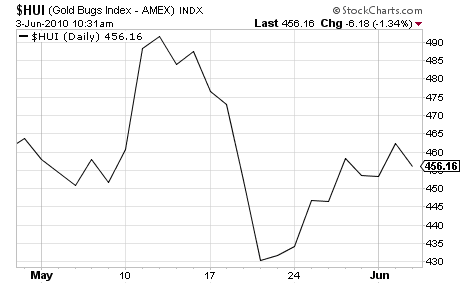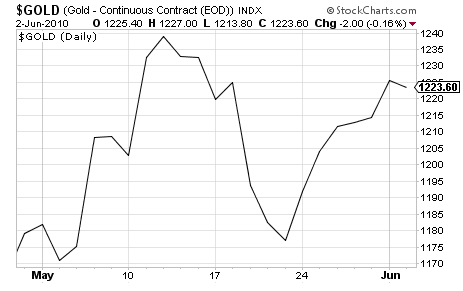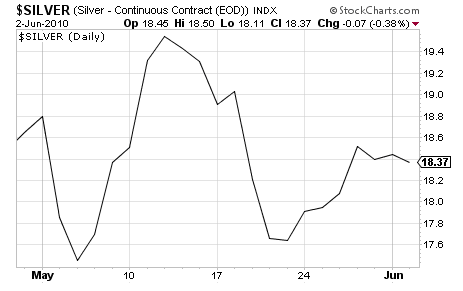- Gold Holds Steady as the Market Falls
- Who Else Owns Munis?
- The Most Important Question Investors Must Ask
Some of the best investors I
know today have big positions in what’s typically viewed as a “safe”
investment.
I’m talking about municipal
bonds. And for reasons I’ll discuss in
this issue, I believe they’re not as safe as many investors believe. What’s my recommendation?
Sell munis, and buy precious
metals and precious metal stocks.
But hey, you’ve heard this
all before from me. If you haven’t
bought gold, silver and the appropriate securities, you’ve already missed out
on some big gains. However, I believe
there’s still plenty of upside. Part of
the reason for that upside is that investors will be flocking away from
traditionally safe investments like muni bonds, and into precious metals.
My proof? Even
as the broad market fell over the past month, the prices of physical precious
metals AND shares of companies that mine and produce them all held steady. Take a look at this chart of the Goldbugs
index (AMEX: HUI) – an index filled
with the 16 largest publicly traded gold and silver companies:

As the broad market dropped
more than 10%, this index ended only a few points lower than it started.
Physical gold prices moved
much higher over the month of May…

…and silver held about
steady.

If you own
muni bonds today, you’re in good company. Researcher Eric Adamowsky, one of the best traders I’ve ever seen, and
one of our own here at Wyatt Investment Research owns a few
tax free muni bonds. Even Warren
Buffett’s holding company Berkshire Hathaway (NYSE: BRK) has a few billion
dollars worth in their portfolio.
I can’t blame them: munis sound almost too good
to be true – most pay a much higher yield than similarly termed
Treasuries. Very few munis have ever
defaulted, and if you buy the right ones, they’re completely tax free.
And what better place to
write about muni bonds than here in Boston – the home of the Big Dig, Boston’s
3.5 mile tunnel under the city. My wife
and I are spending a week here in Boston
for our first anniversary, so we’ve seen the amazing results of the Big
Dig.
It’s one of those massive urban
building projects that is difficult to wrap your head around – but on Sunday we
had the pleasure of visiting Spectacle Island in Boston Harbor
– an old landfill that was the proud depository for thousands of tankers full
of dirt and rock from the Big Dig.
The island increased in size
by over 35 acres thanks to that added landmass. It’s truly an incomprehensible construction project.
What does the Big Dig have
to do with municipal bonds? Well, part of
its sticker price, an estimated $15 billion, was raised through the sale of munis. And until recently, those bond-holders were
in trouble as the State of Massachusetts
froze all bond interest payments after the credit crisis unfolded in 2008.
That changed a few weeks ago
on May 18th, when the newly created Massachusetts Department of
Transportation announced that it would sell $1.1 billion in bonds to refinance
the previously frozen Big Dig bonds.
I don’t know about you, but
issuing more debt to refinance old debt doesn’t fill me with confidence. I realize that the Federal Government does
this exact thing all the time, but they have the benefit of printing money when
they need to pay the bills.
What happens if there’s
another credit crisis, and the MDOT can’t afford to pay the interest on this
new debt? What happens if tax receipts
fall? The State Treasurer has already
shown a willingness to put the brakes on muni bonds if things go against
him. Why should investors expect
anything different the next time the State screws up its finances?
This is
yet another example of why it’s imperative to get some of your net worth into
precious metals, and the appropriate gold and silver stocks. Physical metal is no one else’s liability.
When you buy gold and silver
companies with a good track record of profitability, you’re aligning your
interests with those of the company. The CEO wants the company to earn money,
and in turn the stock price goes up and you win.
When you buy a muni bond,
your interests run counter to those of your debtor. They want your money, but they don’t want to
pay you back if it becomes inconvenient to do so. That’s not an issue when tax receipts are
increasing, and when the market is creating new jobs and new businesses for the
municipality to fill its coffers from.
But in a bear market, when
State Treasurers have to continually issue new debt to pay for old debt, every
muni bond becomes a hot potato.
If you’d
like the immediate protection of gold and silver, as always, I recommend buying
from a reputable dealer. I can
personally speak for kitco and Blanchard’s.
If you’re looking for a good
gold stock, I don’t think you can do any better than to buy a company that Ian
Wyatt, Chief Investment Strategist recently added to his SmallCap Investor Pro portfolio. This company currently sells for under $4 a share, so you can buy a
whole bunch of shares for a few hundred dollars. They also already have producing mines, and
they get gold out of the ground for less than $430 an ounce. Every gain in gold’s price should have a huge
impact on this stock.
To find out more about this
company, click
here for the full write-up.
Good Investing,
Kevin McElroy
Editor
Resource Prospector
 Facebook
Facebook
 Twitter
Twitter